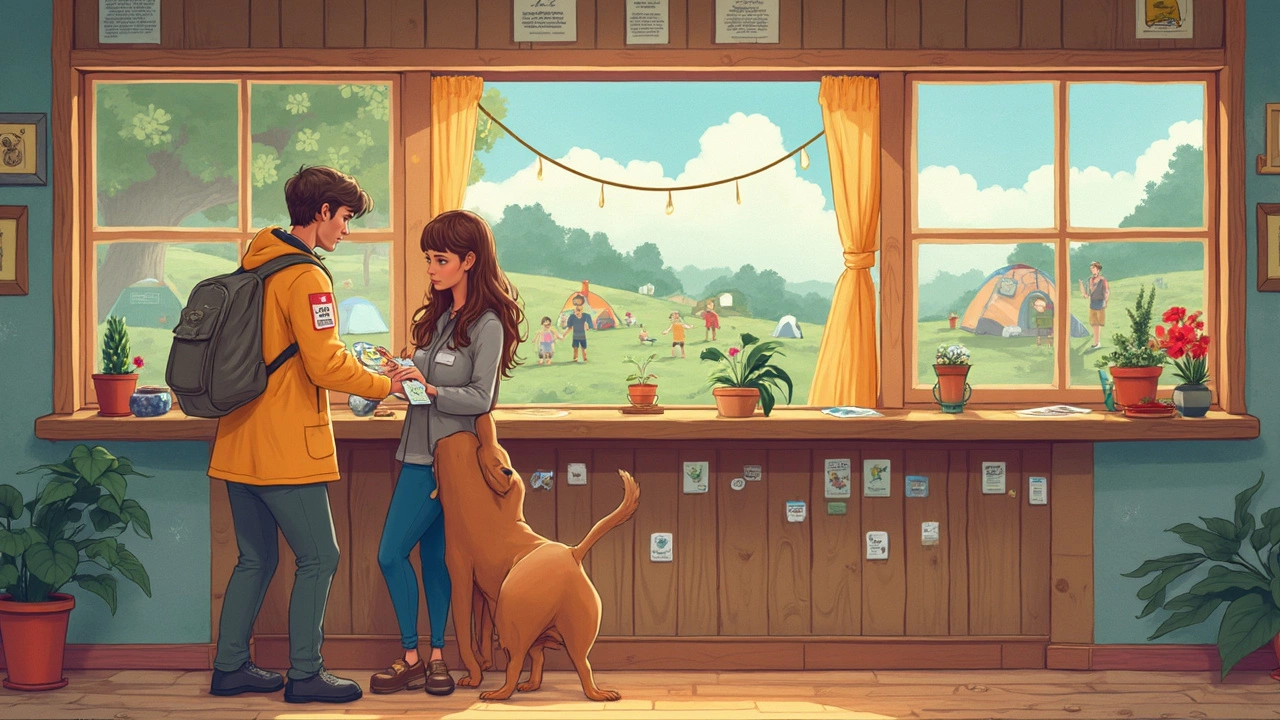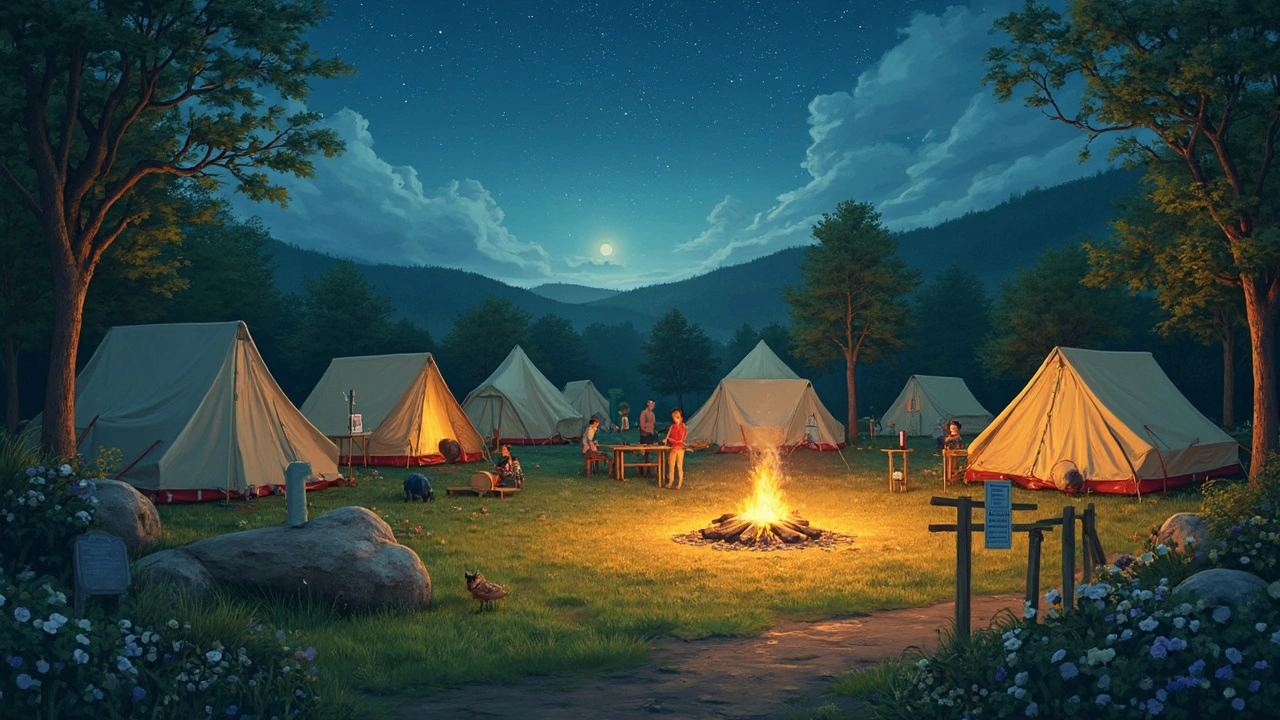Thinking of hitting the great outdoors and camping in the UK? Before you pack your tent and camping gear, there's something you should know: how long you can actually stay on a campsite. It might not be as straightforward as pitching a tent and chilling for weeks. In the UK, there's a mix of local regulations and campsite-specific rules you'll need to consider. Typically, most campsites let you stay for up to 28 days. Sounds good, right?
But here's a twist: this rule isn't carved in stone everywhere. Some places might have stricter restrictions due to local authority regulations, especially during peak seasons when everyone and their dog wants a slice of the outdoor life. It's a smart move to check in with the campsite beforehand. Want to stretch your stay? Sometimes, extending means switching sites or having a chat with the site owner about your options.
- General Camping Rules in the UK
- Seasonal Differences and Popular Destinations
- Essential Tips for a Longer Stay
- Unexpected Perks and Challenges
General Camping Rules in the UK
If you're planning to explore campsites UK, it's crucial to be familiar with the general rules to ensure a smooth camping experience. The whole place is dotted with different camping spots—some are casual, while others might have tighter regulations. A good rule of thumb is to check with the specific site about their rules, as they can vary quite a bit.
The big player in these rules is the length of stay. Most campsites in the UK allow a maximum stay of 28 consecutive days. This is partly due to local council laws, helping to manage land usage and local impact. It's something to keep in mind if you're planning a longer trip across multiple sites, as you might need to move from one site to the next.
Don't forget about noise policies, especially if you're a night owl. Many sites have quiet hours, typically between 11 PM and 7 AM, to make sure everyone enjoys some peace. Also, open fires might be a no-go depending on the campsite—so always ask ahead if you're hoping for the classic campfire experience.
- Always follow waste disposal guidelines. Many campsites have recycling points.
- Dogs are usually welcome, but check for any breed restrictions and ensure they're supervised.
- Camp in designated areas to avoid fines or being asked to leave.
Some campsites might have specific requirements or amenities, and knowing these can enhance your trip. A few well-known sites might offer handy extras like electric hook-ups for a more comfortable stay. Double-checking details like these can make all the difference between a 'meh' and an epic camping trip.
Seasonal Differences and Popular Destinations
When it comes to camping in the UK, the time of year makes a big difference. The camping season typically runs from March to October, but that doesn’t mean all campsites in the UK are bustling year-round. Some sites might close during the chillier months or limit their services. It’s always wise to double-check with the specific site before you plan your visit.
Spring and summer are the most popular times for camping. Why? The weather is friendlier, and there's a ton of activities, from local festivals to hiking trails bursting with life. Places like Lake District and Snowdonia really come to life with campers flocking in. These are not just popular destinations because of their stunning landscapes; they also offer a wide range of campsites catering to all sorts of preferences, from rugged tent pitching to plush glamping experiences.
As for autumn, fewer crowds mean a more laid-back vibe, but it can get a bit nippy, so prepare accordingly. Popular spots like the Scottish Highlands offer breathtaking views during this time, with the autumn colors painting the hills and forests.
Now, if you’re thinking about winter camping, some sites remain open, particularly those offering lodges or heated yurts. This is less about roughing it out and more about cozy winter escapes. Locations like Cornwall harness the milder coastal climate, making them feasible even in the colder months.
Camping around bank holidays or during school breaks? Be prepared for busier sites and possibly needing to book way in advance. The extra demand can sometimes affect how long you’re allowed to stay at some of the busiest campsites UK has to offer.
| Season | Popular Destinations |
|---|---|
| Spring | Lake District, Peak District |
| Summer | Snowdonia, South Downs |
| Autumn | Scottish Highlands, Yorkshire Dales |
| Winter | Cornwall, Brecon Beacons |
No matter the season, always pack for the unpredictable UK weather. A sunny morning can turn into a rainy afternoon, especially in popular camping areas like the Lake District. Staying informed and being flexible about when and where you camp can really make a difference.

Essential Tips for a Longer Stay
Staying longer than the typical weekend getaway at a campsite in the UK? You'll need some practical wisdom to make it a smooth journey. Here are a few tried-and-true tips that could make all the difference.
Communication is Key: Before setting up camp, have a chat with the campsite owner or manager. Express your plans for an extended stay and see if they can accommodate you. Sometimes, being upfront can lead to relaxed arrangements.
Plan for Weather: British weather can be all over the place, even in summer. Make sure you bring adaptable gear like tarps and extra waterproof layers. This is crucial if your visit spans over several weeks, as the weather is bound to change.
Know Your Utilities: If you're planning a long stay, make sure you understand the hook-up facilities for electricity and water. Some campsites offer extended access options, but others might have additional charges or limited availability.
Here’s a quick look at potential costs:
| Utility | Average Extra Cost Per Week |
|---|---|
| Electricity | £10-£15 |
| Water | Usually Included |
Pacing Your Exploration: Instead of trying to see everything in one shot, spread out the sightseeing. This way, you can enjoy your surroundings without getting burnt out. Use your campsite as a base and explore new places each day.
Be a Good Neighbour: Longer stays mean you’ll likely interact more with fellow campers. Being friendly and respectful can lead to great campsite camaraderie, and who knows, maybe some shared stories around the campfire!
Check for Offers: Some campsites have discounts for longer stays, especially during off-peak months. It's worth asking about any seasonal deals as it could save you a bit of cash.
Following these simple tips can make your UK camping adventure both memorable and hassle-free, ensuring you get the most out of your stay without any unwelcome surprises.
Unexpected Perks and Challenges
Staying at a campsite in the UK is a fantastic way to unwind and enjoy nature, but it also comes with its own set of surprises. For starters, you might be in for some unexpected perks. Many campsites offer activities that aren't always advertised, like evening gatherings around a fire pit or guided nature walks. Sometimes, you can even stumble upon local farmers' markets nearby, perfect for the freshest produce or unique souvenirs.
However, along with these bonuses, there are some challenges you might face. The UK weather is famously unpredictable. You might start the day with clear skies only to find yourself drenched by afternoon tea. Packing smart is key: always bring rain gear even if the forecast looks promising, and consider investing in a sturdy tent that's ready for a downpour.
Another consideration is site facilities. Campsites can range from basic to bohemian glamping spots. Not every campsite will provide pristine showers or USB charging stations. Some sites might only offer the essentials, like water and a spot to park your car. It pays to check in advance what's available, especially if you're planning a longer stay, so you're not caught off-guard needing a gadget charge or clean clothes.
Meeting other campers is often a highlight, but it can also be a bit of a social puzzle. Everyone's there to relax, but not everyone's vibe might match yours. Be prepared for a mixed bag of fellow campers—from families exploring the woods to solo adventurers looking for quiet. Embrace it, because who knows? You might learn a few campfire songs or dodge a few unwelcome karaoke sessions under the stars.
And hey, if wild camping calls your name, remember that in the UK, it’s mostly a no-go unless you’re in specific areas like Scotland, where it’s largely permitted. Elsewhere, you’ll need to get landowner permission. This keeps the balance of nature right and reduces the chance of unexpected fines or an early morning wake-up call from an irked farmer.
